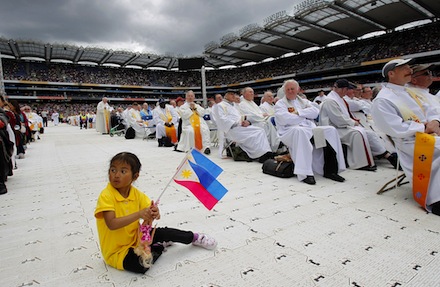People are walking away from
Catholicism
because they do not understand it
If anything, New Atheists only help a faith in decline across Europe
By FR ALEXANDER LUCIE-SMITH on Friday, 22 June 2012
IN THIS ARTICLE
Ireland, Malta, Poland, Richard DawkinsABOUT THE AUTHOR
Fr Alexander Lucie-Smith
Alexander Lucie-Smith is a Catholic priest and a doctor of moral theology. On Twitter he is@ALucieSmith
RELATED POSTS
- The Congress has prepared Ireland for a possible papal visit
- The Eucharistic Congress is promoting the awareness that Irish Catholics are not the only ones that suffer in the world
- The Irish government is going to make it a criminal offence for a priest not to tell the gardai when a sex offender confesses his crime: I say, bring it on
- Only a proper understanding of the priesthood will renew the Irish Church
- In Dublin young families are inspired by august intellectuals who don't mince their words

I had lunch the other day with an influential member of the Anglican communion, who I really ought to see more of. He told me who is going to be the next Archbishop of Canterbury, and more importantly, who is not. Then the conversation moved to matters of general concern, chief of which is why are so few people going to church these days, whether that church be Catholic or Anglican. Was it true, for example, that Catholic practice in Ireland was falling sharply?
The truth of the matter is that religious practice is everywhere in retreat, even in Ireland, even in Malta, even in Poland. And why is this? Well, it is nothing to do with anti-Christian campaigners like Richard Dawkins. If anything they help the cause of Christianity by keeping it on the agenda. So, thanks to Professor Dawkins, rather than otherwise, but he cannot really take credit for the decline in Catholic practice, or Anglican practice either.
Are the scandals to do with child abuse, or the other scandals, the ones to do with P2, the Vatican Bank, Roberto Calvi, the Pope's butler, the supposed murder of John Paul I, are these to blame? Again, I think not. Both of us agreed that the real reason for the falling off was not rejection of the faith but rather ignorance of the faith. People are walking away from Catholicism and Anglicanism not because they reject it, but because they do not understand it.
The ignorance is gross. And this seems to be a widespread phenomenon. Have a look at this posting by an American priest,here. These sentiments are not uncommon, nor are these examples that are cited of gross ignorance of the faith and the practice of the faith isolated ones.
Once upon a time people did know about the faith, and as I have said before, people were able to understand some quite sophisticated concepts, like transubstantiation, purgatory and the communion of saints. But then two things happened: the collapse in educational standards, and the change in approach in catechesis; that these two things happened more or less at the same time spelled disaster for the transmission of the faith.
In some parts of the world the picture is different: Africa, for example, where, as far as I could tell, great care was taken with catechetical materials, and there was good teaching, and, much more importantly, good learning. When I was in Nairobi I quite often used to be asked to do weekends and days of recollection for young people, and frequently they would ask me to speak on things like the resurrection of the body, the Assumption of the Blessed Virgin, and so on – the sort of interests that you associate with the less frequented paths of theology, or with a great interest in knowing all that there is to know about the faith. But I fully accept that people in Nairobi are different to people in the West. They have fewer distractions, are less materialistic and are more interested in metaphysical subjects.
What then must we do? The first thing is surely to look again at the matter of catechesis, and to encourage the catechesis of adults and children alike. In this regard the recent Eucharistic Congress in Dublin and the World Youth Days point the way forward. And we need a national edition of the Catechism of the Catholic Church. Kenya has one. Isn't it time other countries followed suit?
SHARE